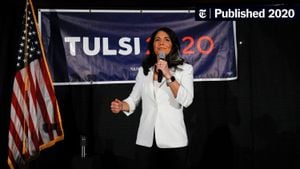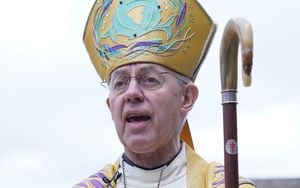President Ilham Aliyev took center stage at the COP29 Climate Summit held recently in Baku, Azerbaijan, steering his nation’s narrative as he vehemently rejected criticisms of Azerbaijan's identity as a ‘petrostate.’ Addressing the World Leaders Climate Action Summit, part of the United Nations climate change negotiations, Aliyev launched his remarks by countering what he described as Western media’s exaggerated portrayal of the country’s oil dependency.
Azerbaijan has had deep roots in global oil production, being the site of the world’s first industrial oil well drilled back in 1846. “If, then, some Western politicians and media called us a petrostate, then it may have been acceptable. But when they call us one today, it's unfair and reflects poorly on their political culture and knowledge,” Aliyev stated, urging for more respect and accurate representation of Azerbaijan's current position, with the country now responsible for 0.7% of global oil production and 0.9% of gas production—a far cry from its peak.
Aliyev argued for assessing nations based on indices such as employment rates and poverty statistics rather than merely their natural resource wealth. According to his remarks, Azerbaijan boasts low unemployment at 5.4% and poverty at 5.2%. These indicators, he asserted, should serve as the standard against which the country’s performance is evaluated. “Every natural resource—be it oil, gas, or renewable resources—should be seen as what they are: natural assets needed by the market and the people,” he emphasized.
Yet, as Aliyev defended the nation’s economic model, the reality of Azerbaijan’s oil production tells another story. Official statistics show production has declined substantially from 38.8 million tons to 30.1 million tons over the past five years, with the country’s influence waning amid changing global energy dynamics. Azerbaijan is keeping its commitment with OPEC Plus to support current oil production levels, agreeing to maintain its quota at 551,000 barrels per day for 2025. These decisions come against the backdrop of the climate summit, illustrating the balancing act for energy-rich nations.
The Conference of the Parties (COP29), attended by about 100 global leaders, is focused on mobilizing climate finance, especially from wealthier countries to support those most affected by climate change. President Biden and President Xi’s absence, two of the world's largest polluters, overshadowed the discussions and raised questions about the summit’s robustness.
Adding to the tension, Aliyev’s remarks did not sit well with many, especially within the European Union. Aliyev’s sharp rhetoric, which included critiques of France and the Netherlands’s colonial past and accusations of political corruption directed at the EU, drew fire from EU foreign policy chief Josep Borrell. Borrell labeled Aliyev’s comments as “unacceptable” and claimed they have the potential to undermine both the objectives of the conference and Azerbaijan's credibility as host.
The EU has consistently asserted its position as the largest contributor to climate financing globally, and Borrell’s comments reflect the friction between European leaders and Aliyev’s government, often criticized for its human rights records. France's President Macron and Environment Minister Agnes Pannier-Runacher both opted to skip the summit, having expressed dissatisfaction with Azerbaijan's existing human rights conditions and its approach to dissent.
Across the summit, calls for improved adaptation strategies and financing for nations grappling with the dangers of climate change were echoed by multiple leaders, including Kazakhstan’s President Kassym-Jomart Tokayev, who affirmed his nation's commitment to climate action. This reflects broader international agreements aimed at coordinating efforts to combat environmental issues amid criticisms over inadequate responses to pressing climate challenges.
Herein lies the broader debate: does the climate conference achieve its mission when hosted by nations where human rights abuses are rampant? At COP29, there are activists who argue on both sides—some see it as hypocritical to hold climate discussions with leaders who repress basic freedoms. Azerbaijani authorities have drawn attention for their treatment of dissenters, journalists, and their approach to religious freedoms, with several faith-based organizations finding themselves at odds with the host nation as they call for awareness and partnerships around what they describe as violations of human rights.
Activists like Arshak Makichyan, who have experienced the fallout of Azerbaijan’s governance, argue for raising the visibility of the Armenian plight—historically overshadowed by the ideologies of nation-states—and seek greater international solidarity. Their voice resonates amid concerns of rising tensions between Armenia and Azerbaijan, especially following the recent ethnic conflicts surrounding Nagorno-Karabakh.
Despite the unique obstacles presented by global politics, climate activists outside the summit are adamant about putting climate justice front and center. A palpable sense of urgency permeates their discourse; they demand more than just dialogue—from sanctions to actions against perceived aggressors like Azerbaijan, contextualizing climate issues within larger international human rights discussions. These activists push back against the simplicity of seeing climate action as merely environmental, framing it instead as interlinked with issues of equity, justice, and rectifying historical grievances.
The discussions at COP29 walk on this thin line, juggling climate imperatives with the stark realities of geopolitical narratives—the stakes are undeniably high. The backdrop of potential changes in U.S. climate policy under a new administration adds to the uncertainty. With Trump promising to withdraw from the Paris Agreement for the second time, it creates apprehension about continuity and commitments made at COP29. Environmental stakeholders remain cautious, aware of the fragility of progress made and the looming shadows of governance shifts.
With the conference still underway, many wonder if substantive resolutions and ambitious commitments will arise from the gathering. Will COP29 usher forward the needed advancements, or will it remain another chapter of discussions lost to political theatrics? Despite the immediate contours of climate action delineated at the summit—a myriad of complex interactions reveal both progress and resistance with power dynamics at play. Activists outside hope for clarity, calling for firm commitments and real-world implementations of promises made behind Baku's closed doors.
Such historical intersections of environment and human rights have demonstrated their resilience, enabling movements to spark change, even within disheartening contexts. While COP29 might face numerous hurdles, there’s still potential for genuine climate action to emerge, grounded not only on economic viability but equity, justice, and broad participation.



